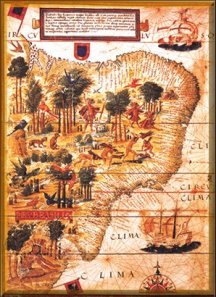 |
The Discoveries |
In the 15th century, having resolved its crisis and stabilised the
country, Portugal launched its expansion to the South and West through
the ocean. The architect of this idea, which would come to change the
world, was the Infant D. Henrique, son of D. João I and one of the most
enigmatic and fascinating figures in the History of Portugal.
A
member of the Order of Christ - heir of the powerful Order of
Templars - the prince based himself in Sagres, alongside the Cape
of Saint Vicente, and set up a navigational centre there which was
equipped with the most sophisticated technology which then existed,
with the most complete maritime charts, a naval arsenal, an observatory
and a school for the study of geography and navigation.
Everything
started in 1415, with the conquest of Ceuta, in the North of Africa,
thus opening Portugal to the commercial use of that important port.
This was followed by the discovery of Madeira by João Gonçalves Zarco
and Tristão Vaz Teixeira and in 1427 Portuguese navigators discovered
the first islands of the Azores. Until the time of the Infante D.
Henrique, nobody had known that anything existed beyond Cabo Bojador.
It was in fact the Portuguese Gil Eanes who was in command of an
expedition which in 1434 went round this Cape on the African coast,
which had caused such terror to sailors.
When D. João I died,
his eldest son - and brother of D. Henrique - D. Duarte,
ascended to the throne and gave a fifth of all the commercial revenues
from the areas discovered as well as the exploration rights beyond Cabo
Bojador to him. The reign of D. Duarte lasted only five years, after
which D. Henrique supported his brother D. Pedro in his rule during the
childhood of his nephew D. Afonso V, and in exchange received
confirmation of his privileges. He also carried out the colonisation of
the Azores during his regency.
A new vessel, the caravela,
brought about great improvements in the expeditions. Cabo Branco was
reached in 1441 by Nuno Tristão and Antão Gonçalves Dinis Dias reached
the River Senegal and rounded Cape Verde in 1444. Guinea was also
reached. In this way, the areas to the south of the great Sahara desert
were finally reached. That meant that D. Henrique had fulfilled one of
his objectives: to move away from the commercial routes of the Sahara
and have access to the riches of Southern Africa.
Throughout
the whole of the 15th century the maritime expansion would continue and
gain an ever-greater economic, political, intellectual and spiritual
importance. The regular voyages along the coastline of the African
continent - but requiring voyages well out to sea on the return
due to the system of winds - opened Europe up to a new world,
which had only previously been known through the memories of Romans and
by contacts with the people of North Africa.
Portugal set up
commercial trading posts and political relations with the states it
came across, and maintained more sporadic contacts with «no man's
lands». Portugal thus started to become the main axis upon which
international trade between Africa and Europe revolved.
The
Portuguese navigators systematically explored the whole Atlantic
coastline of Africa and also its Indian coast, and discovered the
maritime route to India in 1498 under the command of Vasco da Gama.
This voyage, considered one of the greatest adventures of humanity, was
later put into verse by Luís Vaz de Camões in his epic work the
Lusíadas. At the same time, the Portuguese set off in fearless, but
well planned, expeditions to explore the North and South Atlantic. In
1500, Pedro Álvares de Cabral reached Brazil.
At the start of
the 16th century, Portugal dominated the Atlantic and Indian Oceans,
and also reached the North Pacific. The Portuguese fleets enforced the
law in the Indian Ocean, first disputing commercial leadership and then
defeating the Turkish fleets. Lisbon thus became the greatest
commercial emporium in the world, and the lifestyle in Portugal was
based on a commerce which was global for the very first time.
In
Europe, Portugal led the way in fields such as science, cartography and
Physics. It was through the Portuguese that Europeans became aware of
countries and cultures as different as Ethiopia, India, Indochina,
China, Tibet, the islands of the future Indonesia and Japan. The
Portuguese empire was the first and longest lasting of the colonial
empires, existing from 1415 to 1974.
 The Birth of Portugal The Birth of Portugal |
Iberian Union 
|

